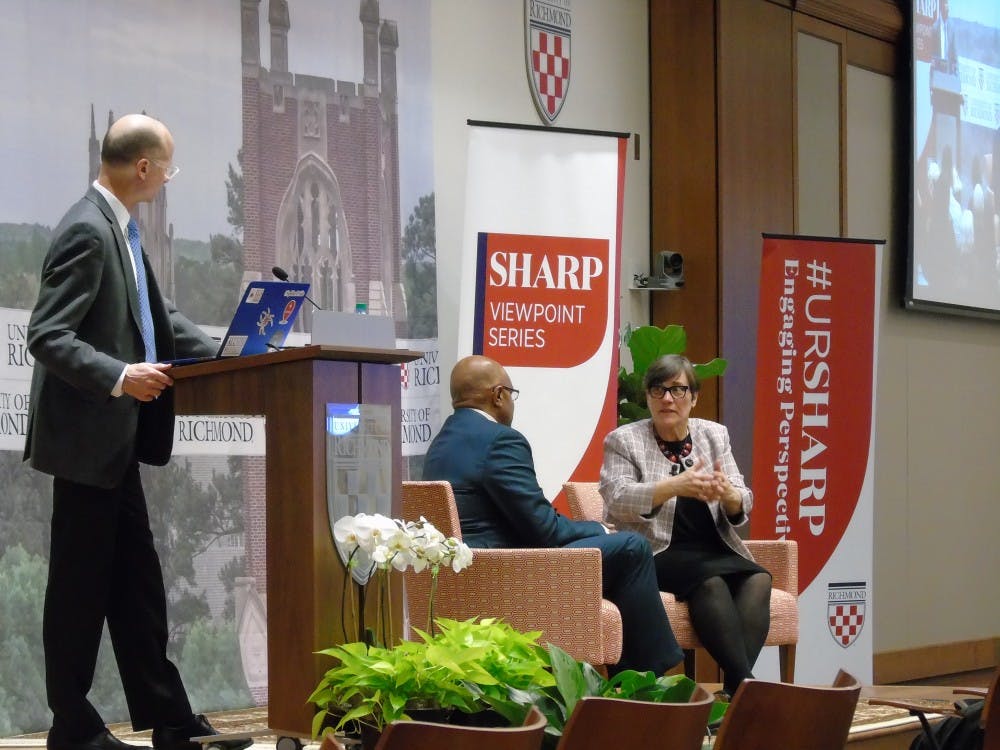Paula Krebs, the Modern Language Association's executive director, spoke at the University of Richmond Thursday night about the importance of studying the humanities in undergraduate education and real-world experience.
As a part of the university’s Sharp Viewpoint Speaker Series, Krebs spoke with President Ronald A. Crutcher in the Queally Center and addressed her concerns about the humanities' weakened role at some colleges and universities.
A humanities major herself, Krebs graduated from La Salle University with a bachelor’s degree in English and holds a doctorate in English — specializing in Victorian literature and culture — from Indiana University. She also taught Victorian literature and culture at Wheaton College.
Crutcher began the discussion by asking Krebs what studying "the humanities" meant.
“The fields that study the work that’s produced from the arts and music through human thought, human action and human production — those are the humanities,” Krebs said. “The humanities make meaning out of what we create.”
Krebs reflected on the particular moment when she believed students began turning away from humanities degrees.
“People started to freak out and think they were only going to do a college degree if they knew what exact job it was going to get them right out of college,” Krebs said.
When the stock market crashed in 2008, and even before then, people stopped going to college to learn things that they wanted to learn and started going to college for workforce preparation, she said.
“The rhetoric that you get from a state commissioner of higher education, a government or business leader is that ‘we need to train people for tech careers or healthcare careers or business jobs,’” Krebs said. “That’s a panic move, and it does not reflect the way people hire.
“And we [the humanities] haven’t gotten the right PR yet to make clear what our value is.”
Krebs explained various factors, other than the 2008 stock market crash, that she said had caused this shift in value away from the humanities. Parents account for some of the change, she said.
“Parents are afraid to let their students go to college and major in what they want,” she said. “They want to know what exactly are you going to do when you get out. That mindset punishes the humanities.”
Enjoy what you're reading?
Signup for our newsletter
Krebs emphasized the importance of not only students working against the urge for guaranteed job security, but also of the role career services offices, alumni relations offices and faculty members in convincing students of the value of a humanities degree.
“Any job you get would be impressed to see somebody who can combine an interest or a love for the humanities with an ability to do well in a math course, coding course or science course,” she said. “There are many entry-level jobs out there that do not require a degree in a particular field.
“Students who do not major in what they love are cheating themselves of four years of learning what they love for the sake of an entry-level job that’s going to teach them the job skills that they need anyway.”
Today, we often talk about the humanities only with regard to their usefulness to particular professions, Krebs said.
“Humanities Indicators,” a research project the American Academy of Arts and Sciences conducted, found that in 2015 the share of bachelor’s degrees in the humanities was just under 12 percent, with degrees in business and management at 19 percent and degrees in the sciences at 37 percent.
To change the way universities and colleges approach humanities degrees, students must recognize the valuable post-graduate advantages and skills they can gain from those degrees, Krebs said.
Advocating for the value of humanities degrees is just the first step toward reinstating their prominence in college culture, Krebs said.
“I don’t think we need to apologize for our skill set,” Krebs said. “We can do what we’re trained to do in real ways and with collaboration between other disciplines.”
Contact international editor Emma Phelps at emma.phelps@richmond.edu.
Support independent student media
You can make a tax-deductible donation by clicking the button below, which takes you to our secure PayPal account. The page is set up to receive contributions in whatever amount you designate. We look forward to using the money we raise to further our mission of providing honest and accurate information to students, faculty, staff, alumni and others in the general public.
Donate Now



